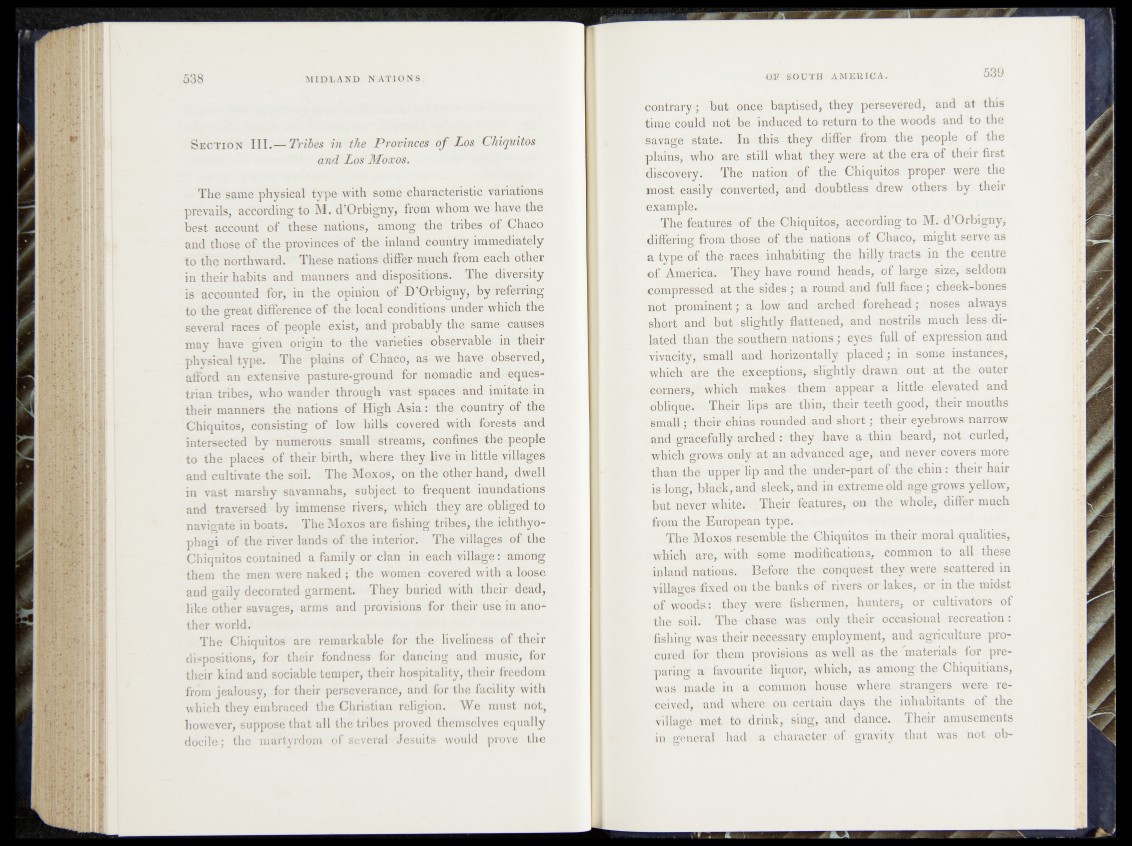
S ection III.— Tribes in the Provinces o f Los Chiquitos
and Los Moxos.
The same physical type with some characteristic variations
prevails, according to M. d’Orbigny, from whom we have the
best account of these nations, among the tribes of Chaco
and those of the provinces of the inland country immediately
to the northward. These nations differ much from each other
in their habits and manners and dispositions. The diversity
is accounted for, in the opinion of D’Orbigny, by referring
to the great difference of the local conditions under which the
several races of people exist, and probably the. sarne causes
may have given origin to the varieties observable in their
physical type. The plains of Chaco, as we have observed,
afford an extensive pasture-ground for nomadic and equestrian
tribes, who wander through vast spaces and imitate in
their manners the nations of High Asia: the country of the
Chiquitos, consisting of low hills covered with forests and
intersected by numerous small streams, confines the people
to the places of their birth, where they live in little villages
and cultivate the soil. The Moxos, on the other hand, dwell
in vast marshy savannahs, subject to frequent inundations
and traversed by immense rivers, which they are obliged to
navigate in boats. The Moxos are fishing tribes, the ichthyo-
phagi of the river lands of the interior. The villages of the
Chiquitos contained a family or clan in each village : among
them the men were naked; the women covered with a loose
and gaily decorated garment. They buried with their dead,
like other savages, arms and provisions for their use in another
world.
The Chiquitos are remarkable for the liveliness of their
dispositions, for their fondness for dancing and music, for
their kind and sociable temper, their hospitality, their freedom
from jealousy, for their perseverance, and for the facility with
which they embraced the Christian religion. We must not,
however, suppose that all the tribes proved themselves equally
docile; the martyrdom of several Jesuits would prove the
contrary^; -but once baptised, they persevered, and at this
time could not be induced to return to the woods and to the
In this they differ from the people of the
plains, who are still what they Were at the era of their first
discovery. The nation^ of the Chiquitos proper were the
most easily, converted, and doubtless drew others by their
example;.
The features of the,Chiquitos, according to M. d’Orbigny,
differingjrom those of the nations of Chaco, might serve as
a type\of the races inhabiting the hilly tracts in the centre
of America.. They have round heads, of large siae, seldom
compressed at the sides ; a round and full face,' cheek-bones
not prominent; a low and arched -forehead; noses always
short and but slightly flattened, and nostrils much less dilated
than the southern nations; eyes full of expression and
vivacity, ,««3.11 and horizontally placed; in some instances,
which are the exceptions, slightly drawn out at the outer
comers, which makes, them, appear a little elevated and
oblique;'- Their lips are thin, their teeth good, their mouths
small; their chins rounded and short; their eyebrows narrow
and gracefully arched : they have a thin heard, not curled,
which grows'only at an advanced age, and never covers more
than the upper lip and the Under-part of the chin: their hair
is long, black, and sleek, and in extreme old age grows yellow,
but never whiter Their features, on the whole, differ much
from the European type. ^
The Moxos resemble the Chiquitos in their moral qualities,
which are, with some modifications, common to all these
inland nations. Before the conquest they were scattered in
villages fixed on the banks of rivers or lakes, or in the midst
of woods: they were fishermen, hunters, or cultivators of
the soil. The chase was only their occasional recreation:
fishing was their necessary employment, and agriculture procured
for them provisions as well as the 'materials for preparing
a favourite liquor, which, as among the Chiquitians,
was made in a common house where strangers were received,
and where on certain days the inhabitants of the
village met to drink, sing, and dance. Their amusements
in general had a character of gravity that was not ob